
Post written by Corey Poirier.
Learn more about his unique speaking program at www.thespeakingprogram.com

Interviewing over 4,000 of the world’s most influential leaders, there is one thing I know for sure. Your "why" matters.
The most common thing I find during my interviews is that the world’s top leaders have a strong clarity around their true purpose, and their actions are focused around supporting that why.
There's another thing I know for sure. If you know your why, you’ll figure out the how.
The power of serving a strong why has resulted in more innovations today than we can count — not the least of which includes almost everything Steve Jobs created at Apple.
This is why determining one’s why is even more powerful for business owners and/or leaders.
So the immediate question becomes: How does one determine their why?
This question is one that I have dedicated much time to, and I can tell you that discovering your why probably won’t be easy. It often takes time and it absolutely takes action.
The good news is that even though there is no surefire exercise for guaranteeing the discovery of your why, the exercise I’m about to share has helped many people discover theirs or get much closer over the years.
First thing's first: grab a pen and piece of paper. Of course, you can use your laptop or phone, but I think this is one of those exercises that benefit from an old-school approach.
I’d like you to start by making a list that answers some, or perhaps all, of these questions:
• What is it that I would do if money wasn’t an issue (perhaps if I won the lottery)?
• What is it I did when I was a child that got me most excited?
• What would I do for free?
• When I wanted to go in one direction but people talked me out of it, what did I want to do?
• What do I think I’d be good at?
• What do I love doing (i.e., when I do this, I don’t watch the clock)?
• What do I believe strongly in?
• What would I do if I knew I couldn’t fail?
When people talk about winning the lottery, they often say that if they were to win, they would move to a beach and never work again — they would do nothing. It sounds good in theory, but I believe we all need a purpose to identify with.
Most people would move to the beach for a short time, but most people would get tired of being at the beach daily and miss people close to them, interacting with people, etc. I also believe that when people lose their sense of purpose (be it a job, being around family, etc.) they also lose their innate desire for living.
That’s exactly why I believe it’s so important to truly reflect on and answer that question of what you would do if money wasn’t an issue.
So now that you have a list of things you would do if all other obstacles were removed, I invite you to prioritize the list in order of which items (i.e., playing guitar, photography, coaching others, teaching) you feel are the ones that most speak to or call out to you.
I’m all about spending your time efficiently, so the next step involves taking action in these areas, as they will have the best odds of helping you discover your why. In fact, one of those top passion areas on your list may be the thing that helps serve your why.
For instance, perhaps you choose coaching as the top priority on your list, and as you start taking baby steps in that direction, you ultimately figure out that your why is helping others realize their biggest dreams and/or goals so that you can have an invisible impact on the lives they positively impact.
In terms of taking action on the list item (and I realize this is the scary part for some) I recommend you figure out what the baby steps look like in relation to your item list. For example, if it were coaching, perhaps the baby steps include researching coaching online, reaching out to some coaches to see if you can take them out for lunch and pick their brain or schedule a coaching call with a potential coach or maybe even hire a coach yourself.
Once you’ve outlined the baby steps, it’s time to start taking the small steps that bring you closer to the item on the list. This way it’s not as scary as jumping into the big item.
I also recommend you reward yourself each time you successfully take another baby step as this will help motivate you to continue.
The key goal here is to start striking items off your list until one lights your fire and reveals the area that serves your why. It will reveal your why in the process.
Although this exercise isn’t guaranteed, when you consider that so many people live their entire lives without discovering their why, while so many have accomplished so much in serving their why, isn’t it worth taking this small journey?
Who knows — perhaps in doing so, you’ll impact hundreds, thousands or even millions of lives in the process.